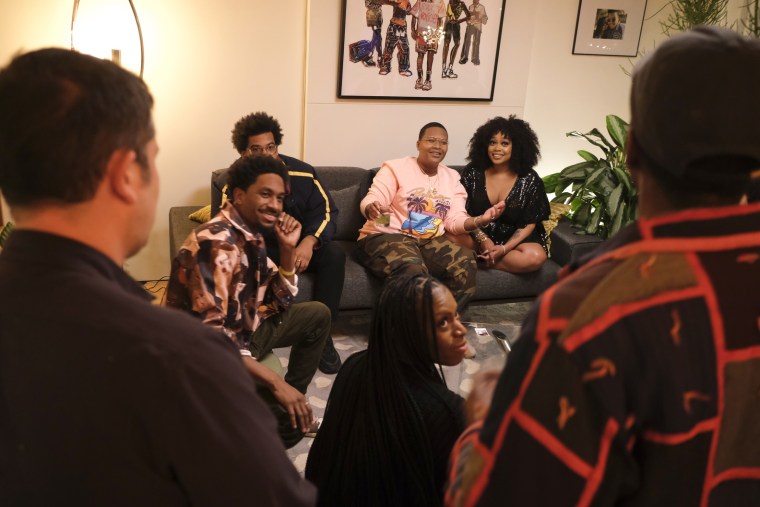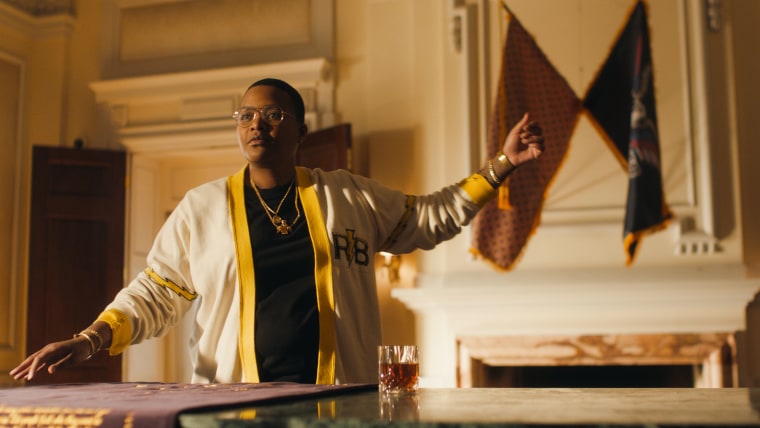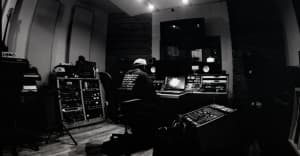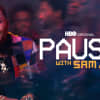 Krystal Stark, Jak Knight, Zack Fox, Sam Jay, Yaya Vincent. Image via HBO.
Krystal Stark, Jak Knight, Zack Fox, Sam Jay, Yaya Vincent. Image via HBO.
On HBO's PAUSE with Sam Jay, viewers are more than just an audience—they're invited to an intimate house party with comedian and former SNL writer Sam Jay and her cast of opinionated friends and fellow comedians. Toeing the line between comedy, social commentary, and clever skits, Sam Jay flips the late-night format from behind a desk to space often rife with opposing opinions. In its first episode, Sam tackles the idea of Blackness as a monolith, hopping between raucous arguments about appropriation and community criticism in her own home to interviewing two Black conservatives with whom she ends up having surprisingly more in common with than she thought.
By the show's second episode, Jay takes on the delicate balance of celebrity, delving into how someone can go from beloved to social pariah in a matter of minutes if not seconds and even trying out a number of cringe-worthy scenarios with a crisis manager. "Say I shit my pants in public," she asks."Would I need a crisis manager for that?"
The hilarious episode feels like the ideal setup for the show's third episode, where Jay explores the idea of personal freedom and liberation in its many forms. Like any space where opinions and personal politics vary, tensions fly, but are often subdued by a perfectly-timed punchline. After over a year inside and away from most of our family and friends, PAUSE offers a glimpse into the familiar moments we probably miss most: dimly lit apartments, drinks, and a host of characters with their own understanding of the world.
The FADER sat down with Sam Jay to learn more about representation, potential backlash, and who, if anyone, "wins" these energetic debates.
 Sam Jay. image via HBO.
Sam Jay. image via HBO.
The FADER: The show has this really dope “party” format, why was it important to anchor the show with this space where you commune with friends and other comedians? What else pushed you towards that format?
Maybe subconsciously that was a part of it was just like craving those interactions again. But the main thing that pushed me towards it is, honestly, that's just the most authentic version of me that you can find: me socializing, drinking with friends, and screaming about something that I believe I'm correct about.
How is the process for writing your own show different from writing for SNL?
The process is different because when you're writing for SNL, you have to consider everybody that you're casting. What they're good at, what their strengths are, the roles that you're putting them in. When you're writing your own show, you're just writing for yourself. I have to consider all the writers and I have to make sure that all of them feel like they're breathing life into this thing and they're a part of what the end product is. So, I think the pressure shifts from "oh my God, I gotta write this right for Kate" to "Oh, my God, I have to carry this right for [writers] Ryan [Donahue], Emmy [Blotnick], Zack [Fox], Langston [Kerman], Robin [Henry], Megan [Gailey], and Jak [Knight]".
I get the sense that nobody “wins” in any of the debates, everyone just agrees to respect each other’s opinions. Is your opinion ever swayed by any of the debates in the end?
I think my opinions are always being influenced. I don't know if necessarily swayed, but I'm hearing everyone and I'm considering what they're saying. And I think that's why you don't get the energy of "win or lose." Because we're all just bringing our life's perspective to the table and saying what we think. have I ever been swayed in an argument? I feel like episode three kind of does. I'm pretty steadfast on this idea that I can't be a stud with my titties out. But as the episode grew in the room, and we got to the soul stroke of it all it was kind of like, I can't be kind of asking and challenging people to step out of their comfort zones if I'm not going to be willing to step out of mine. And so I do think it's more of a growth process than an immediate sway. But, I also think that's how I am in my life, I'm pretty stubborn. So I usually take something someone says and carry it with me until another life experience makes me go "ok, that makes sense. They were correct on that thing."
Do you anticipate any backlash from that as a Black, queer creator with respect to how personal politics are handled on the show? For example, did you have any concerns about having the Black conservatives on the first episode or that piece about appropriation?
Of course, there's going to be backlash, because people are always going to agree or disagree with you or your perspectives. But I do think that I have to keep the integrity of what I'm doing at the forefront of what I'm doing. I thought that it was important to talk to those Black conservatives, because it fit the narrative of what we were discussing, and I also thought it was important to put a lens on the fact that Blackness is not a monolith. Our approach to what we feel is best for the culture may be different, but we should still be embracing all of those things because they are still all a part of the culture. I feel like we're so ready to kick Black people out of Blackness that don't align with a very narrow view of what that is. I just wanted to try to expand that because I think there's definitely more power in numbers. And I do think that there is more that we can do together than we can do apart.
Who do you feel like your ideal audience is?
Honestly, whoever watches the show. I do have a hope that people who grew up in similar environments to where I grew up can turn on the TV and finally see something on Late Night that feels like them and feels like it's trying to connect and communicate with them. I just feel like so many people get these opportunities and feel like "oh, now I got a button-up, put on a suit, and be something else." I'm a big advocate of not doing that because you limit the number of people who come from where you come from having access to you. You should be able to come in as you are and be embraced for your ideas, your heart, and your spirit and not because you speak a certain way or you wear chains. That stuff doesn't really matter when it comes to someone's humanity.
In the first two episodes so far, music plays an important role: from setting the mood of this kickback to you choosing this national anthem (which, I raise you a classical take on “Ante Up”). How did you know that working with Knxwledge was going to be a great fit for the show?
I didn't know! It was just a vibe with his music and his energy. I thought he was funny! We spoke one night one evening and I just was like, this dude gets it and he's funny and he's chill. We set up a meeting with HBO and he shows up late because he couldn't figure out how to use Zoom. He was smoking a joint and blowing the smoke in the camera, and the first thing he said was, "I don't know how to use this Zoom shit. I've never done it before." And I was like, this guy's gonna be perfect.
PAUSE with Sam Jay airs on HBO Fridays at 9, and streams on HBO Max.

